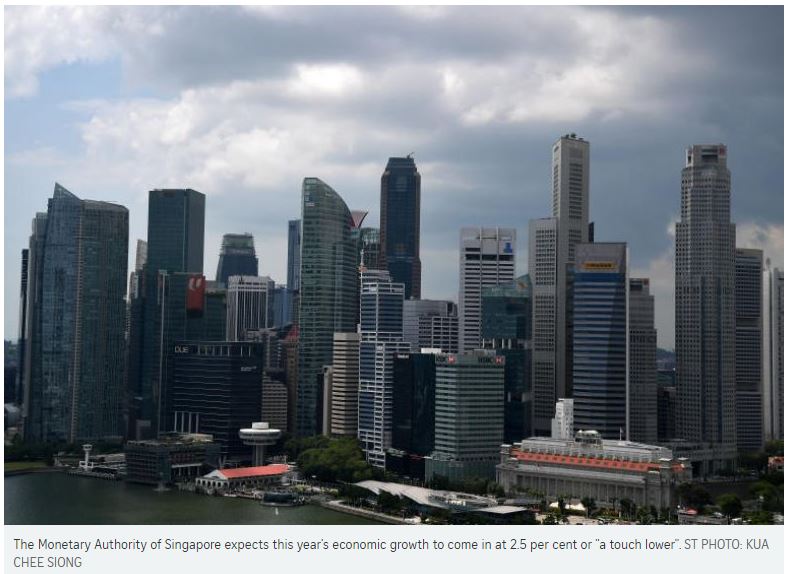Singapore economy expected to moderate towards a more sustainable pace this year: MAS
SINGAPORE – The Monetary Authority of Singapore (MAS) expects this year’s economic growth to come in at 2.5 per cent or “a touch lower”, bringing it closer to its potential.
“This is not a bad outcome,” said MAS managing director Ravi Menon.
“It will bring the level of GDP closer to its potential. There is no need to stimulate the economy.”
He explained at the Citibank Asia Pacific Investors Conference on Wednesday (Feb 27) that the Singapore economy is “moderating towards a more sustainable pace” in line with the global economy.
The economy did well last year (2018) by growing 3.2 per cent but Mr Menon expects external demand to be softer this year, “reflecting slower global GDP growth and the maturing of the global tech cycle”.
“Manufacturing and trade-related sectors will feel most of the external drag,” he said.
“If there is a sharper slowdown, Singapore’s healthy macroeconomic position gives it the resilience to absorb the shock,” he said. The Republic also has the policy space to mitigate the impact, he added.
“Central banks from the (United States Federal Reserve to the European Central Bank and the Bank of England) are exercising more patience and flexibility,” he said in response to a question on whether he expects central banks in the region to loosen monetary policy. “There is room to take a pause and watch how the data pans out.”
The US central bank’s recent decision to adopt a wait-and-see approach towards future policy changes is the “most significant expression of this new mood”, Mr Menon said.
“It has helped to allay investor anxiety over the future pace of rate hikes and its impact on growth in both the US and global economies,” he said.
The move has also resulted in “a significant easing of financial conditions globally and helped lift sentiments in the near term”, he added, pointing out that the easing will provide Asia with “some relief and policy space”.
“Still, central banks have to assess the balance of risks carefully,” he warned, explaining that “a premature loosening of monetary policy could risk undoing recent gains in restoring currency stability”.
Mr Menon’s comments come as the MAS prepares to announce its monetary policy stance in April after recent disappointing economic data. The central bank manages policy through changes to the exchange rate rather than interest rates.
Singapore reported its slowest year-on-year economic growth in the fourth quarter, its biggest fall in exports and the biggest fall in factory output in more than two years.
“What we will do (for the next monetary policy decision) depends on the growth and inflation outlook then,” he said, adding that the monetary policy here remains appropriate.
The MAS allowed the Singdollar to rise slightly faster for the first time in six years last April and tightened monetary policy again in October as the economy continued to expand steadily then.
A stronger Singdollar that corresponds to a tighter monetary policy counters inflation by making imports cheaper.
A weaker Singdollar conversely can help lift economic growth by making exports cheaper abroad.
Source: https://www.straitstimes.com/business/singapore-economy-expected-to-moderate-towards-a-more-sustainable-pace-this-year-mas


 English
English




